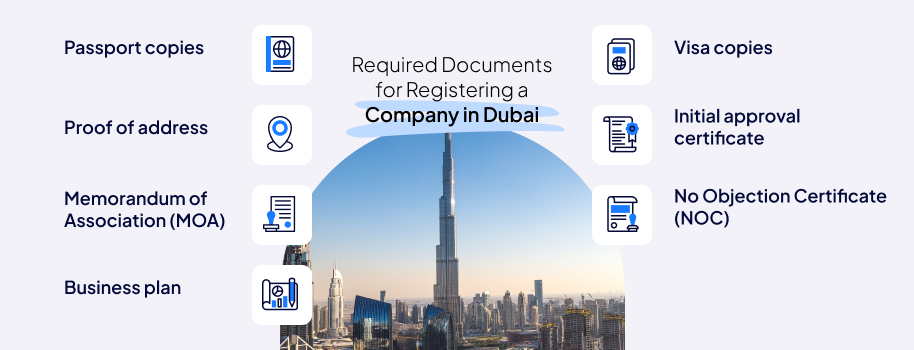Dubai, a global business hub, has long been a magnet for entrepreneurs and investors worldwide. With its strategic location, tax-free incentives, and world-class infrastructure, the city offers unparalleled opportunities for business growth.
The World Bank’s Ease of Doing Business Index ranks the UAE among the top 20 countries for business-friendly regulations, making company registration in Dubai an efficient and streamlined process.
Introduction
Dubai’s business world is a testament to its vision of becoming a global economic powerhouse. According to the Dubai Chamber of Commerce, the emirate is home to over 300,000 businesses, contributing significantly to its GDP.
The city’s business-friendly policies, such as 100% foreign ownership in free zones and mainland areas (under specific conditions), have made it a preferred destination for entrepreneurs.
But why is company registration so crucial?
Registering your business ensures legal compliance and enhances your credibility, enabling you to operate seamlessly in the UAE and beyond. If you are targeting the local market or expanding internationally, a registered company in Dubai can be your gateway to success.
This blog will walk you through the 6 essential steps to register a company in Dubai. Let’s build a better understanding of the essentials required for registering a company in Dubai.
Dubai’s Business Dynamics
Before diving into the registration process, it’s essential to understand Dubai’s business ecosystem. The UAE offers three primary business jurisdictions:
- Mainland Companies: These businesses can operate anywhere in the UAE and are regulated by the Department of Economic Development (DED). However, mainland companies often require a local sponsor who holds 51% ownership.
- Free Zone Companies: Free zones like DMCC, JAFZA, and DIFC offer 100% foreign ownership, tax exemptions, and customs benefits. However, free zone companies are restricted to operating within the zone or internationally, unless they partner with a local distributor.
- Offshore Companies: This is an ideal option for international businesses. Offshore companies are exempt from taxes and can operate outside the UAE. They do not require a physical office in Dubai.
Did You Know? Dubai’s free zones contribute over 33% to the emirate’s GDP, according to the Dubai Free Zones Council.

Eligibility Criteria for Company Registration
Before opening a company in Dubai, it is a prerequisite to meet all the eligibility criteria. By considering it, the picture becomes clearer in understanding the dynamics of viable business options in Dubai. To register a company in Dubai, you must meet the following eligibility criteria:
- Legal Requirements: Depending on your business activity, you may need to meet minimum capital requirements. For instance, a mainland LLC requires a minimum capital of AED 300,000, though this is often not mandatory.
- Residency Requirements: While you don’t need to be a UAE resident to register a company, obtaining an investor visa is advisable for long-term operations.
- Business Activity Approval: Ensure your chosen activity is permitted in your selected jurisdiction. For example, certain activities like banking and insurance require additional approvals.
Documents Required for Company Registration
Documents are one of the basic and most valuable assets for registering a company. It is important to be aware of the required documents. Also, to avoid delays, prepare the following documents in advance:

- Passport copies of shareholders and managers.
- Visa copies (if applicable).
- Proof of address (e.g., utility bill, tenancy contract).
- Initial approval certificate from the DED or Free Zone Authority.
- Memorandum of Association (MOA) for mainland companies.
- No Objection Certificate (NOC) from current sponsor (if applicable).
- Business plan (for certain activities or free zones).
Pro Tip: Keep digital and physical copies of all documents to streamline the process.
Step-by-Step Process of Registering a Company in Dubai
Step 1: Choose the Right Business Structure & Jurisdiction
One of the most critical decisions in setting up a business in Dubai is selecting the appropriate business structure and jurisdiction. This choice impacts licensing requirements, ownership rules, taxation, and operational scope.
Business Structures Available in Dubai
| Sole Proprietorship | 100% owned by an individual, ideal for small businesses and freelancers. |
| Limited Liability Company (LLC) | The most common structure for businesses, requires a UAE national as a partner for mainland companies. |
| Free Zone Company | Allows 100% foreign ownership, suitable for businesses operating within designated free zones. |
| Offshore Company | Ideal for international businesses that do not intend to operate within the UAE. |
| Branch of a Foreign Company | Allows international companies to establish a presence in Dubai without forming a separate legal entity. |
Mainland, Free Zone, or Offshore?
- Mainland: Requires a local sponsor (except for professional services), permits business operations anywhere in the UAE, and allows direct dealings with the UAE market.
- Free Zone: Offers full foreign ownership, tax exemptions, and simplified processes but restricts business activities within the designated free zone.
- Offshore: Ideal for international trade and asset protection, but does not allow business operations within the UAE.
Which business structure is right for you?
Consider factors such as ownership control, target market, and business activity before making a decision.
Step 2: Select Your Business Activity
Dubai has a comprehensive list of over 2,000 permissible business activities, classified under different licenses:
- Commercial License (for trading businesses)
- Professional License (for consultants, service providers, and freelancers)
- Industrial License (for manufacturing and industrial operations)
- Tourism License (for travel agencies, tour operators, and hospitality businesses)
Certain industries, such as healthcare, education, and finance, require additional approvals from regulatory bodies like the Dubai Health Authority (DHA) and the Central Bank of the UAE.
How to Choose the Right Business Activity?
- Research the market demand for your intended business activity.
- Ensure that your chosen activity aligns with the license type.
- Check if additional permits or approvals are required.
- Consult with a business setup advisor for expert guidance.
Did you know?
The UAE’s non-oil sector contributes 71% to the country’s GDP, with industries like technology, e-commerce, and logistics witnessing rapid growth (UAE Ministry of Economy, 2023).
Step 3: Choose & Reserve a Trade Name
A unique and compliant trade name is essential for registering a business in Dubai. The Dubai Department of Economic Development (DED) and respective free zone authorities govern trade name approvals.
Trade Name Guidelines
- The name should be unique and not similar to existing businesses.
- It must comply with ethical and moral standards.
- It cannot contain offensive or religious terms.
- If using a person’s name, it must be the full name (no abbreviations).
Trade Name Reservation Process
- Conduct a name search through the DED or free zone portal.
- Submit the name for approval and pay the reservation fee.
- Receive a trade name reservation certificate valid for 30 days.
How do you check trade name availability?
You can verify name availability through the DED website or respective free zone portals.
Step 4: Apply for Initial Approval & Obtain Licenses
Once you finalize the trade name, the next step is to get an Initial Approval Certificate from the relevant authority. This certificate confirms that the Dubai government has no objections to your business setup.
Types of Licenses Available
- Commercial License – For businesses engaged in trading and general commerce.
- Professional License – For service providers such as consultants, IT firms, and freelancers.
- Industrial License – For manufacturing and industrial businesses.
- Tourism License – For travel agencies and tour operators.
Required Documents for Initial Approval
- Passport copies of shareholders and directors
- Business plan (for certain activities)
- No Objection Certificate (NOC) from the sponsor (if applicable)
- Trade name reservation certificate
Did you know?
The UAE offers 100% foreign ownership in mainland businesses for certain sectors, reducing the need for local sponsorship (UAE Investment Law, 2021).
Step 5: Find a Business Location & Secure Office Space
The UAE requires businesses to have a physical office or workspace. The type of office depends on the jurisdiction:
- Mainland: Requires a leased office and Ejari registration (tenancy contract registration).
- Free Zones: Options include flexi-desk, shared offices, and executive offices.
How to Choose the Right Location?
- Consider proximity to your target market and clients.
- Evaluate the cost of renting office space.
- Ensure compliance with business activity regulations.
- Look into virtual office options for cost-effective solutions.
Did you know?
Dubai is home to over 40 free zones, each catering to specific industries such as technology, finance, and media.
Step 6: Register the Company & Open a Corporate Bank Account
Final Company Registration
Once all approvals are obtained, submit the necessary documents to complete the registration. The company will receive a Trade License, allowing business operations.
Key Documents Required:
- Memorandum of Association (MoA)
- Articles of Association (AoA)
- Local Service Agent (LSA) agreement (if required)
Opening a Corporate Bank Account
A UAE-based corporate bank account is essential for transactions. Requirements vary based on the bank but generally include:
- Trade License copy
- Passport copies of shareholders
- Proof of business activities (in some cases)
How to Choose the Right Bank?
- Compare banking fees and transaction costs.
- Evaluate online banking features.
- Consider international transfer options.
- Check for minimum deposit requirements.
What is the best bank for business?
Consider factors such as digital banking features, international transfer facilities, and minimum deposit requirements.
Final Thoughts
Registering a company in Dubai is a strategic move for businesses looking to thrive in a dynamic and tax-efficient economy.
By following these six essential steps, you can navigate the process efficiently. Remember, proper registration not only ensures compliance but also enhances your business’s credibility and growth potential.




